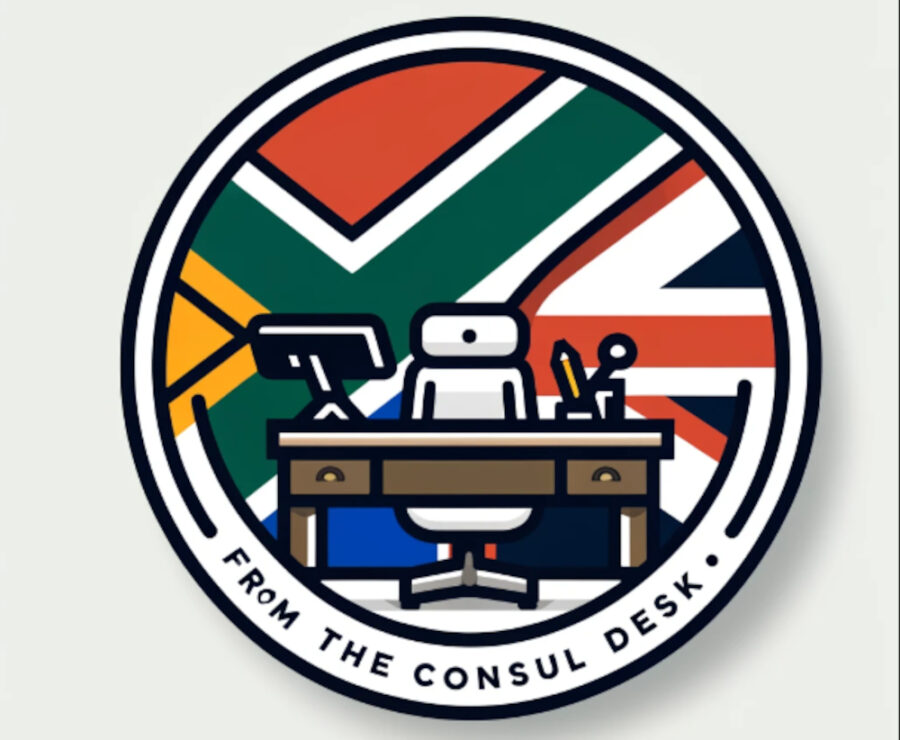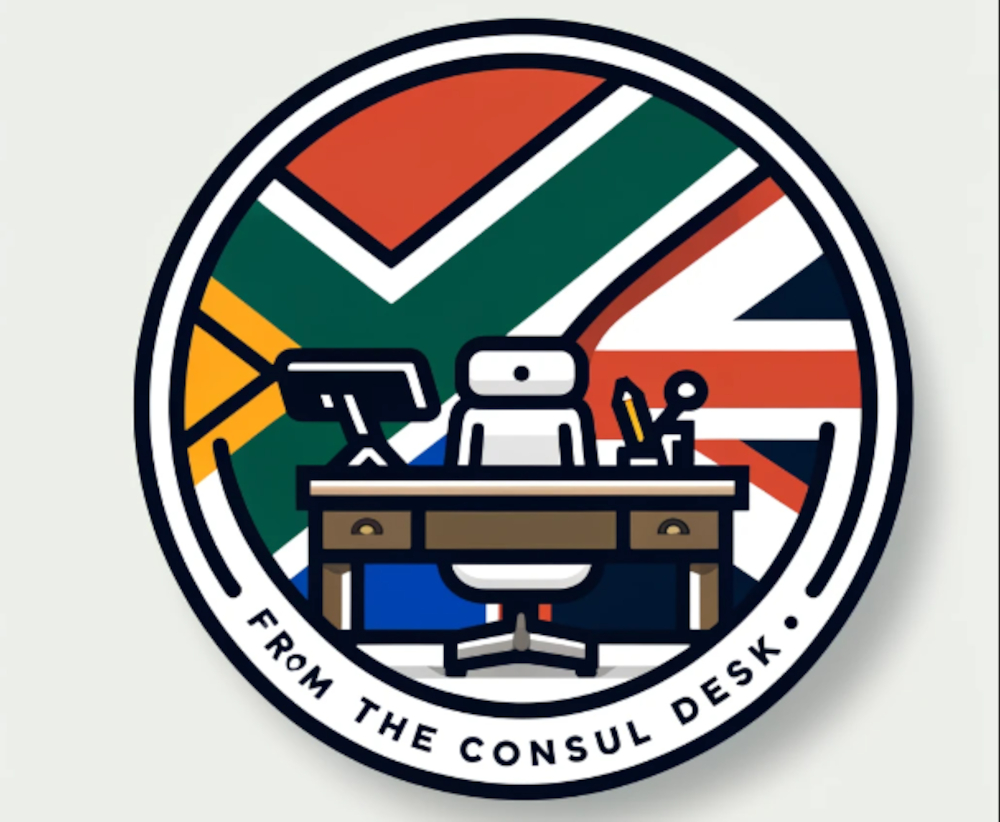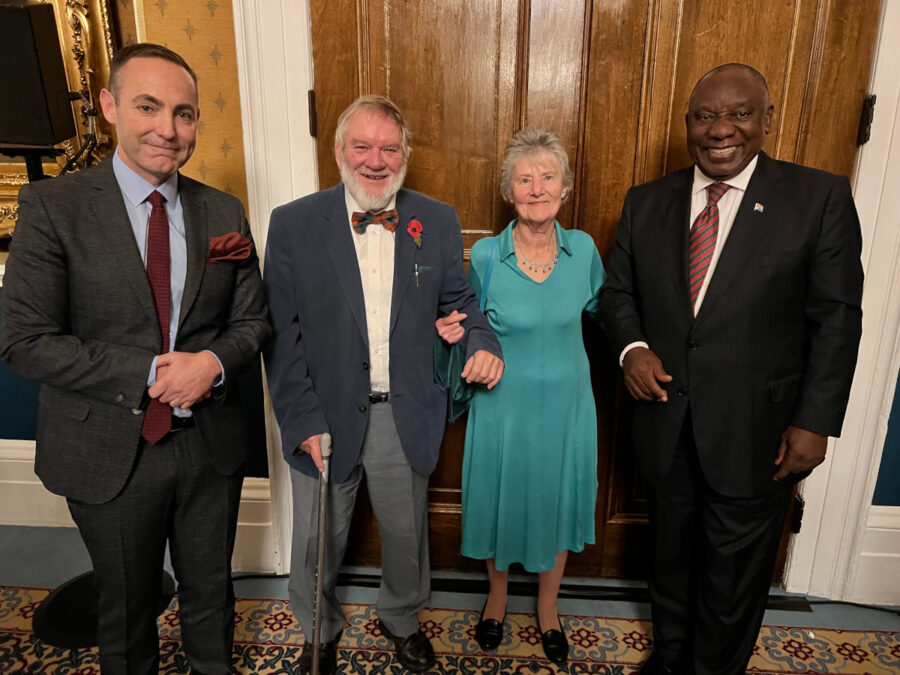
An intersection of diplomacy and entrepreneurship
Avi Lasarow explores his own unique intersection of diplomacy and entrepreneurship through the lens of a SA Honorary Consul for the UK and as an entrepreneur.

Welcome to the inaugural edition of “From the Hon Consul’s Desk,” a new regular column dedicated to exploring my own unique intersection of diplomacy and entrepreneurship through the lens of a South African Honorary Consul for the UK and as an entrepreneur.
My aim is to offer insights into the roles, challenges, and opportunities that come with bridging two distinct, yet interrelated worlds: international relations and business innovation. I intend to bring to you stories of South Africans abroad and invite my colleagues working alongside me in this privileged role.
But first let me share with you all what is an Hon Consul, the role as defined and the privilege of serving my country as a result of this prestigious appointment made nearly 12 years ago, at the time the youngest ever appointed Hon Consul of South Africa globally.
The role of an Honorary Consul, as defined under the Vienna Convention on Consular Relations, is multifaceted, involving duties ranging from protecting the interests of their sending country to supporting nationals abroad.
While the Vienna Convention, established in 1963, primarily outlines the framework for diplomatic conduct and consular practices, it also serves as a cornerstone for understanding the legal and formal responsibilities that come with the consular role.
For those interested, a deeper look into the Vienna Convention can provide a comprehensive understanding of the international legal framework governing the activities of consuls around the world.
What is an Honorary Consul?
An Honorary Consul is like a bridge between two countries.
Imagine if two neighbourhoods needed to help each other out – sharing information, making sure everyone is safe and supported, and sometimes hosting each other for special gatherings.
In the world of international relations, an Honorary Consul plays a similar role between their home country and the country they reside in.
Unlike full-time diplomats who often come from the country they represent, an Honorary Consul typically lives and works in the host country and may even be a citizen there.
They’re not employed full-time by the government they represent, but they’re entrusted with certain responsibilities.
These can include helping people from their home country who are living or traveling in the host country, promoting cultural and economic ties between the two countries, and sometimes helping with bureaucratic tasks like processing documents.
How does someone become an Honorary Consul?
Becoming an Honorary Consul isn’t like applying for a regular job.
You don’t just submit a resume and wait for an interview.
Instead, it’s a position that comes with recognition of one’s standing in the community, expertise, and often a deep connection to the home country – either through heritage, interest, or professional ties or acts of recognition by the government.
Here’s a simplified version of how the appointment usually works & in my next column I will share some key events with you that lead to my own appointment.
Nomination: This could come from the home country’s government or through other channels that recognise an individual’s contributions or potential to foster relationships between the two countries.
In my case the nomination was jointly done by both the former High Commissioner to the UK Dr. Zola Skweyiya, the serving president of South Africa at the time President Jacob Zuma and the South African Minister if International Relations Mrs. Maite Nkoana-Mashabane.
Approval Process: The host country – in this case, the UK – needs to agree to the appointment.
This involves checks to ensure there’s no conflict of interest and that the nominee is suited to the consular role.
Upon nomination by South Africa my credentials were sent to the UK FCDO (Foreign, Commonwealth &
Development Office) for vetting and agreement of the appointment.
The FCDO also review the area you are assigned as your constituency and make sure that interests in the area notable. In this case mine was the Midlands region in the UK.
Official Appointment: Once approved by the FCDO, the nominee is officially appointed as an Honorary Consul and becomes a formal non-paid diplomat for the country.
Together with this appointment comes a letter from the president together with a formal minute note that is on public record of this appointment.
I will include some images of this in later columns.
In this regular column, I intend share stories from the front lines of diplomacy, insights into my entrepreneurial journey, the synergies between these two arenas and how they can intersect.
As South Africa’s Honorary Consul in the UK, my mission extends beyond traditional diplomatic activities; it is also about fostering economic ties, supporting South African businesses in the UK, and promoting cultural exchange and understanding between our two nations.
The entrepreneurial spirit is not confined to the business world; it also plays a crucial role in diplomacy.
Innovating, problem-solving, and building networks are as essential to the success of a consul as they are to an entrepreneur.
This series will explore how these skills are applied in diplomatic scenarios and how they can lead to successful outcomes in international relations.
One of the primary aims of this column is to shed light on the challenges and triumphs of South African entrepreneurs in the UK.
The journey of a business from conception to international expansion is filled with hurdles and milestones.
By sharing these stories, I hope to provide valuable lessons and inspiration for aspiring entrepreneurs and established business owners alike.
We will delve into case studies, interview successful business figures, and discuss strategies that can help South African businesses thrive in the UK market.
Furthermore, this column will serve as a platform to discuss broader topics such as the impact of Brexit on South African companies, legal and regulatory challenges, and cultural adaptation in the UK.
Understanding the UK’s business landscape is crucial for South African companies looking to establish or expand their presence here.
I will draw upon my experiences and insights to guide businesses through these complex processes.
I will also touch on the essential services offered by the consulate, including consular assistance, navigating the legal landscape, and accessing educational and cultural exchange opportunities.
It is vital for South Africans living abroad to understand the support available to them and how they can engage with their consulate for various needs.
In conclusion, “From the Hon Consul’s Desk” aims to be more than just a column; it is intended to be a resource, a community hub, and a source of inspiration for South Africans in the UK and beyond.
Whether you are an entrepreneur, a student, a professional, or simply interested in the nexus of diplomacy and business, I hope you will find value in the stories and insights shared here.
As we embark on this journey together, I encourage feedback, questions, and suggestions for topics you would like to see covered in future editions.
Let’s explore the vast potential of South African entrepreneurship and diplomacy, fostering a vibrant community that supports and uplifts one another in our shared goals and aspirations.
Thank you for joining me at the Hon Consul’s desk.
Here’s to exploring new horizons and building bridges between South Africa and the UK, underpinned by
the enduring principles of the Vienna Convention and the dynamic spirit of entrepreneurship.
Thank you to the SAPeople website whom without their support this would not be possible.
PS: Did you know that our current president Cyril Ramaphosa was for many years the Hon Consul for Iceland?
Please contact me at avi@honconsul.uk.com
Author bio:
Avi Lasarow was born in Johannesburg. He is a South African-British businessman in the field of genetics. Much of his work has been centred around DNA testing and the development of hair alcohol testing. He is based in the United Kingdom and also acts as an Honorary Consul between South Africa and the UK.

Avi Lasarow together with President of South Africa Cyril Ramaphosa and former friends of anti-apartheid movement. Image: Supplied
